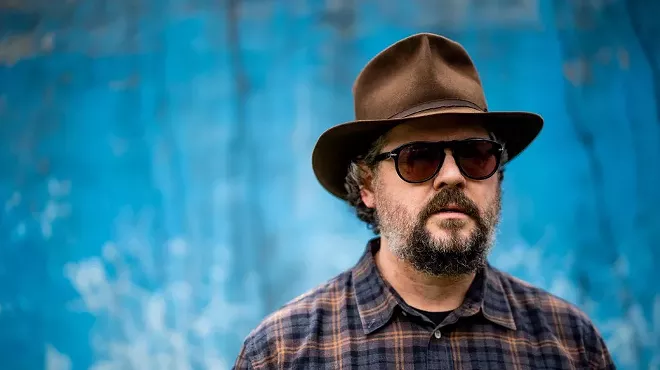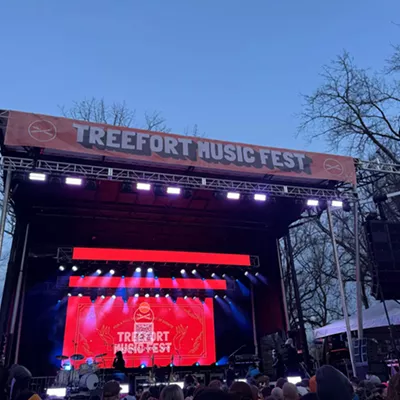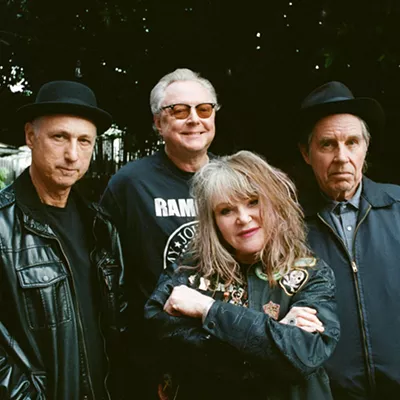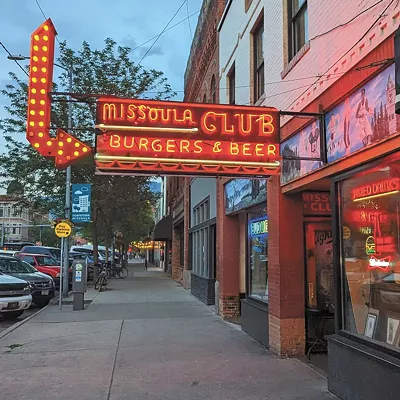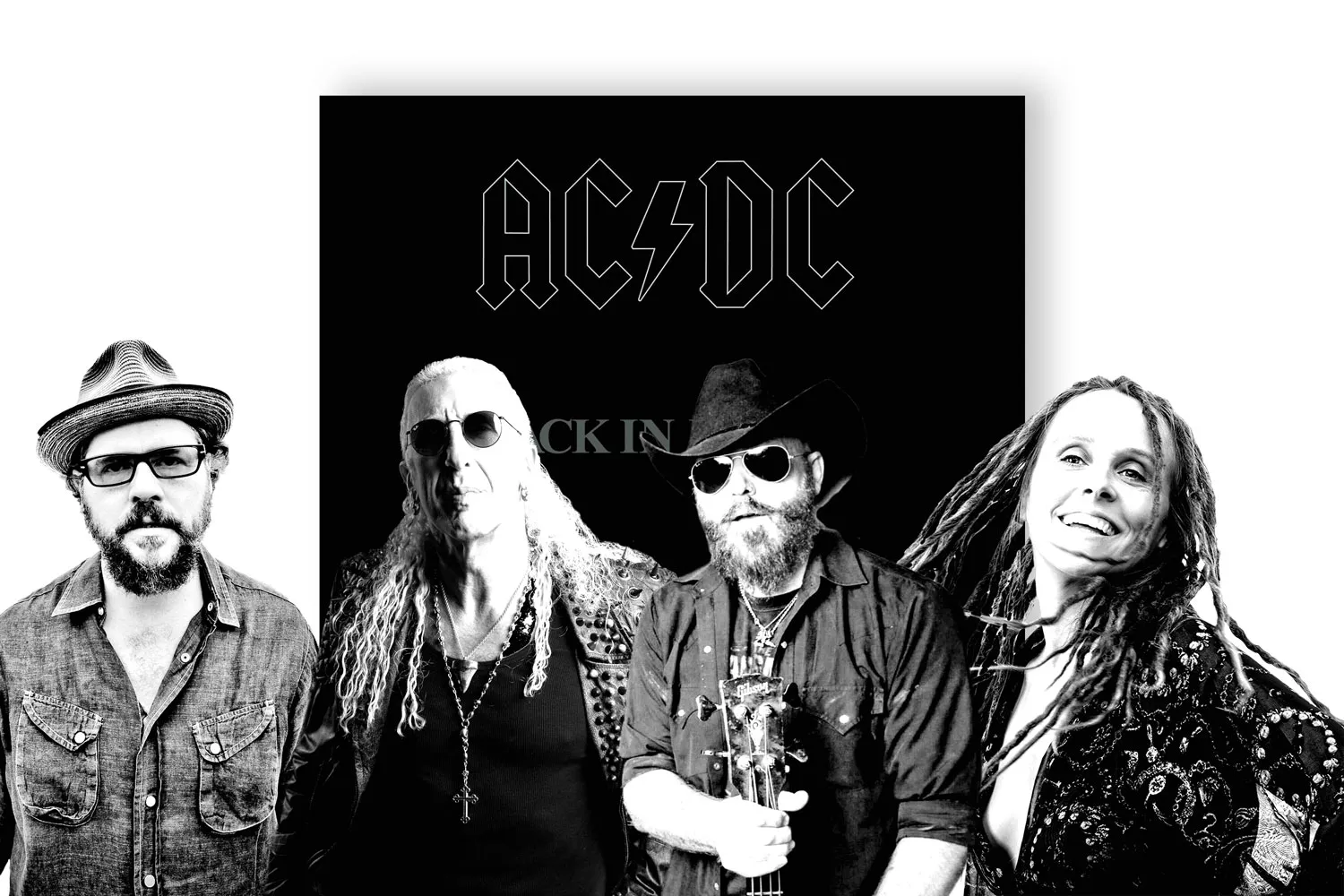
When Patterson Hood saw AC/DC in concert, they made an impression that not only made Hood a massive fan, but inspired him to write a song for his band the Drive-By Truckers stealing the title of that AC/DC tour: "Let There Be Rock."
It was Thanksgiving weekend 1977 in Charleston, West Virginia, and Hood was visiting his grandparents. He saw an ad in the local newspaper for a show at the town's Civic Center, AC/DC on their first American tour.
"I was 13 years old, which is probably the perfect age for something like that, and my grandmother took me," Hood tells the Inlander from his Portland home. "She bought my ticket, it was $3 for three bands, and she sat in the parking lot with a flashlight and read a book while I was inside just getting my ass rocked off. That's how I got turned on to AC/DC. I'd seen their name, I knew their logo, but I had never heard their music. Not a note of it."
Growing up in Alabama, Hood was already a voracious music fan. But his town only got one or two concerts a year, so he'd been limited to artists like Linda Ronstadt and Chicago. His AC/DC adventure was, to put it mildly, eye-opening.
"It was my first time experiencing that kind of rock show," Hood says. "Girls taking off their tops, and just a cloud of weed. The Charleston Civic Center is a shithole. It was a dump. But it was awesome. The best ever."
If you listen to Hood's often politically charged and progressive-minded music with the Drive-By Truckers (who were forced to cancel a Spokane July show), there's little in common with AC/DC beyond the loud tools of the rock trade. But the Australian quintet led by guitarist brothers Angus and Malcolm Young forged the kind of sound — basic, driving, blues-inflected rawk — that made headbanging fans of everyone from sorority girls to corporate suits, Top 40 pop lovers to adolescents destined to one day start their own bands.
Nowhere is this more clear than with Back in Black, AC/DC's album celebrating its 40th anniversary July 25. Back in Black has sold 50 million albums worldwide, and this past December the Recording Industry Association of America recognized its surpassing 25 million copies sold in the U.S. That's more than any Beatles album, or any Led Zeppelin, Pink Floyd, Billy Joel, Whitney Houston or Garth Brooks releases. The artists with albums that have sold more copies in America than Back in Black? Michael Jackson and the Eagles. That's it. That's the list.
For AC/DC, Back in Black wasn't just a massive breakthrough to the mainstream. They'd actually already had that with 1979's Highway to Hell, their sixth album and first to go platinum in America. But original lead singer and lyricist Bon Scott died six months after Highway to Hell's release. And within six weeks the band had found a new singer in Brian Johnson and headed into the recording studio to try and keep up their momentum against massive odds.
What could have been a career-ending tragedy turned into AC/DC's career-defining triumph.
Dee Snider is a lifelong AC/DC fan. The lead singer for Twisted Sister and radio host recalls over the phone when he knew Back in Black was a touchstone for music fans well beyond his own metal and hard rock community.
In 2005 VH1 Classic tapped Snider to host A Very Classic Thanksgiving, a roundtable chat among musicians led by Mr. Sister himself.
"It was Teri Nunn (of Berlin), (E Street Band sax man) Clarence Clemons, MC Hammer, (the Monkees') Davy Jones, Eddie Money. It was very weird," Snider says. He had some questions written down to keep the conversation going, including one asking each guest to name one song that defined them as both a person and an artist.
"What song would that be, MC Hammer?" Snider remembers asking. "And I'm thinking he's going to go with 'U Can't Touch This.' I thought everyone would go with their hits. And MC Hammer goes 'bomp, ba-ba-bomp, ba-ba-bomp (the riff to Back in Black's title track). And on queue, the whole table — including Davy Jones! — was banging their head to that riff! It just struck me that, without compromising, this record had infiltrated everybody, all genres, had reached a larger rock community and was appreciated and respected."
While Snider credits Bon Scott's vocal style for helping inspire his own, he considers Brian Johnson an ideal replacement on Back in Black, "a person that compliments the old vocalist but has a style of his own."
The Supersuckers' Eddie Spaghetti didn't even know Brian Johnson was "the new guy" when Back in Black turned him into a fan. Growing up in Arizona, he was "kind of a new wave kid" more interested in the Knack, Blondie and the Cars. When he first heard "You Shook Me All Night Long" on the radio in 1980, on its way to becoming AC/DC's first Top 40 single, he thought it was a new Rod Stewart song.
That tune, Spaghetti says from his San Diego home, "led me on this really incredible journey through the AC/DC catalog." He considers AC/DC part of the Holy Trinity inspiring his own long-running band, along with the Ramones and Motorhead. "I like that they purposefully don't grow and they don't change," Spaghetti says. "They've got a formula and they stick to it. And that's what makes them special."
AC/DC aficionados largely consider Bon Scott a better lyricist than Brian Johnson, and Back in Black was a massive hit despite some of the most juvenile, fumbling and, yes, offensive lyrics imaginable on songs like "Givin the Dog A Bone" and "Let Me Put My Love Into You." Tunes like those taught Spaghetti a valuable lesson for his own songs.
"They kind of proved to me that the lyrics don't really need to matter that much," Spaghetti says. "What you're singing about doesn't necessarily have to be the reason why you're making the song up. It can just be about the rhythm and the cadence."
Adrian Connor has been making a living the past 18 years playing guitar in Hell's Belles, an all-female AC/DC tribute act, and she agrees the lyrics to some of AC/DC's songs can be a little hard to take for a bunch of ass-kicking feminist rockers.
"When we first started the band, (original singer) Om (Johari) was quick to point out that Bon's lyrics were way less anti-feminist than Brian's lyrics were," Connor says from her Austin, Texas, home, noting that on Back in Black, "some of the deeper cuts on the album are actually pretty anti-respectful to females."
Even so, it was Back in Black that made Connor a fan when she was going to Kennedy Catholic High School in Burien, Washington. At school assemblies, they'd play "You Shook Me All Night Long" and Connor says "I got goosebumps right away" when she first heard it. She was hooked for life.
Playing "Angus Young" in Hell's Belles, Connor's performed the entire AC/DC canon, and done tours where they play Back in Black in its entirety. Asked what makes that album special for fans, Connor has a simple answer: "Magic."
"Just the quality of the songs. Being a person who learns a lot of their songs, [Back in Black] is their most difficult guitar work," Connor says. "It's very blues-based, but Back in Black has this balance. The blues is there, but there's melody to it that isn't obvious."
What is obvious is that Back in Black's songs are, top to bottom, some of the most memorable in hard-rock history. They allow a tribute act like Hell's Belles to perform everywhere from country bars to corporate yachts, and they've connected with a sprawling audience.
The Drive-By Truckers' Hood says some might romanticize the Bon Scott era of AC/DC, but Back in Black is the gold standard for hard-rock albums.
"Back in Black, it's like Fleetwood Mac's Rumours, just a meticulously crafted record," Hood says. "And it holds up. I could go play it right now and it still sounds like a million bucks.
"'Hell's Bells' was a perfect opening. 'You Shook Me All Night Long' is a perfect rock 'n' roll single. 'Back in Black' is damn close to a perfect rock 'n' roll single, too. My favorite is 'Have A Drink On Me.' Again, the parallel's to Rumours, even though they're different subgenres of rock. Every songs seems like an essential piece of the puzzle. And the fact they put it out just months after Bon Scott died, I think it's one of the most miraculous rock 'n' roll stories." ♦



